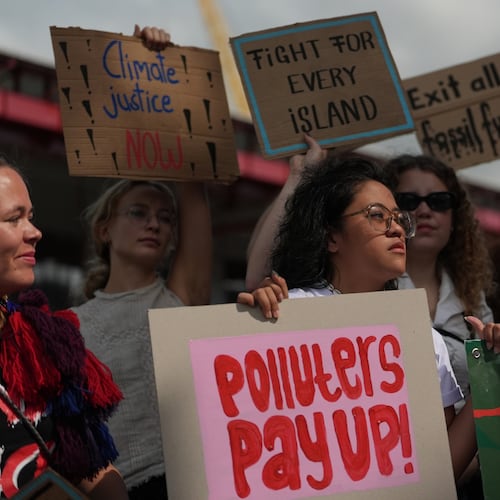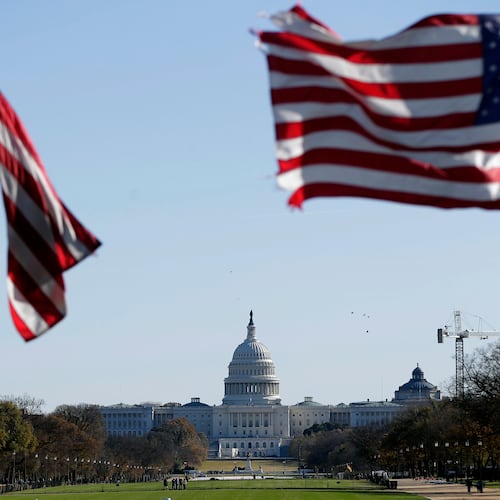BELEM, Brazil (AP) — Battered by last month's ferocious climate-fueled hurricane, Jamaica joined other small island nations and impoverished countries at Monday's United Nations climate talks to implore the rest of the world to stop talking and start acting. Their message: Our lives are on the line.
As high-level ministers from governments around the world took over negotiations at the conference called COP30, vulnerable nations lined up to say how important it is for countries to cut emissions. They said the world's current climate plans aren't strong enough to keep warming below the 1.5 degree Celsius (2.7 degrees Fahrenheit) set by the 2015 Paris Agreement.
In addition, they renewed a longstanding call for rich nations to do more financially to help poor countries deal with warming.
“Hurricane Melissa changed the life of every Jamaican in less than 24 hours,” said Matthew Samuda, the country's economic growth minister. The Category 5 hurricane that hit three weeks ago caused almost $10 billion in damage and displaced hundreds of thousands of people. He called it evidence of “the new phase of climate change."
“We did not create this crisis, but we refuse to stand as victims,” Samuda said. “We call on the global community, especially major emitters, to honor their commitments and safeguard the 1.5 degree threshold for Jamaica. This is survival. It’s about our people and their right to a safe and prosperous future.”
Armando Rodriguez Batista, Cuba's environment and science minister, noted his country was flooded by Melissa.
“Tomorrow it will be too late to do what we had to do a long time ago," he said.
Speakers lament slow progress
Other nations reiterated the life-or-death nature of stepping up the fight to cut emissions, calling it “a moral duty” and saying climate damage is their day-to-day reality.
“I sit on the roof of the house all night, looking at the neighbors, thinking whether or not the water will swallow us all,” Romanian Environment Minister Diana-Anda Buzoianu said, reading the words of a victim of this year's floods in her country.
“Promises alone will not hold back the rising seas,” Seychelles Environment and Climate Minister Flavien Philomel Joubert said.
A ruling earlier this year by the International Court of Justice that climate change is a planetary existential problem that must be fixed is “leverage” that small island countries will use to speed up climate-fighting efforts at COP30, said Tuvalu Attorney-General Laingane Italeli Talia.
That ruling shows that “the 1.5 target is not just a political aspiration, but a legal obligation informed by the best available science,” Tuvalu Environment and Climate Minister Maina Vakafua Talia said as thunder from a passing storm reverberated through the hall.
“We are seeing the 1.5 target disappear before our eyes," Talia said, adding that for small islands “it is the line between our survival and loss.”
But stronger climate plans and saving 1.5 is important for the whole world, not just small islands, he added.
COP30, more heavily fortified after a pair of demonstrations disrupted the main venue in the first week, kicked off its second week with foreign and other ministers stepping in for the lower-level negotiators who handled it earlier. They have far more power and leeway to make tough political decisions, and U.N. Climate Executive Secretary Simon Stiell told them to use it.
“The spirit is there, but the speed is not," Stiell said. “The pace of change in the real economy has not been matched by the pace of progress in these negotiating rooms. As climate disasters wrecked millions of lives and hammer every economy, pushing up prices for food and other basic needs, we all know what’s at stake.”
Other speakers also urged quicker action.
“The time for promises is over,” Brazil Vice President Geraldo Alckmin said. “Each additional fraction of a degree of global warming represents lives at risk, greater inequality and greater losses for those who contributed least to the problem.”
U.N. General Assembly President Annalena Baerbock said recent disasters show how much needs to be done.
“The climate crisis is unrelenting,” she said. “We saw this when Hurricane Melissa barreled into the Caribbean two weeks ago. We saw it again last week at the Philippines ... near back-to-back typhoons.”
‘Our existence is at stake’
Adding to the pressure, late Sunday the Brazilian presidency of the talks issued a five-page summary on how to proceed on several sticky issues. Those include pressing nations to do more in their new emissions-cutting plans, handling of trade disputes and barriers involving climate and the need to deliver on last year's $300 billion annual pledge for climate financial aid to poor nations.
Those difficult issues weren't part of the original agenda nor the COP30 presidency's plans, but several countries pushed for them.
Several countries — especially small island nations — have asked that the talks address the inadequacy of the emissions-cutting plans submitted by 116 nations so far this year. Collectively, the plans come nowhere close to cutting heat-trapping gases enough to prevent breeching the 1.5-degrees Celsius warming limit since the 1800s.
That issue may get combined with a call for a plan for phasing out fossil fuels — coal, oil and natural gas, the chief cause of climate change. That phaseout was agreed to after much debate at U.N. climate talks two years ago, but last year, little happened on the issue. Brazilian President Luiz Inácio Lula da Silva earlier this month raised the issue anew.
“Our very existence is at stake,” Mauritius Foreign Affairs Minister Dhananjay Ramful said. “A decade after the promises of the Paris Agreement, despite our good intentions, we realized that we have not done enough. ... Our planet demands action now.”
___
The Associated Press’ climate and environmental coverage receives financial support from multiple private foundations. AP is solely responsible for all content. Find AP’s standards for working with philanthropies, a list of supporters and funded coverage areas at AP.org.
___
This story was produced as part of the 2025 Climate Change Media Partnership, a journalism fellowship organized by Internews’ Earth Journalism Network and the Stanley Center for Peace and Security.
Keep Reading
The Latest
Featured


